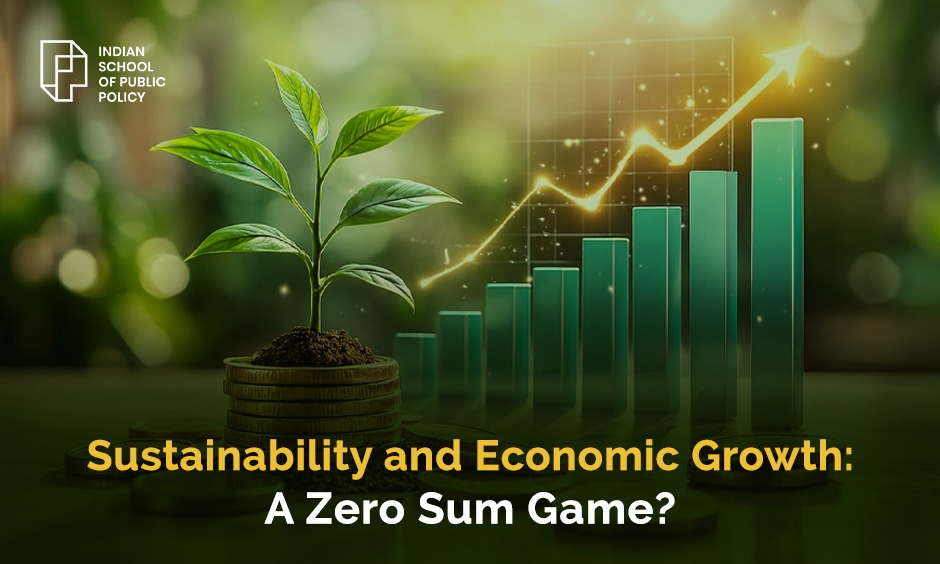Table of Contents
Sustainability and Economic Growth: A Zero Sum Game?

Is the tradeoff between ecological sustainability and economic growth a zero sum game? Often, paying heed to sustainability concerns is seen as an impediment to rapid economic growth. However, with increasing extreme weather events, unpredictable climate patterns, frequent occurrence of external shocks, and a dynamic geopolitical environment, the verdict is clear. Accounting for and incorporating sustainability is fundamental to drive long term competitiveness. For this a robust public policy strategy is essential for any country.
India’s Sustainability Policy and National Strategy
India’s sustainability policy is a comprehensive national strategy encompassing the UN Sustainable Development Goals (SDGs) and integrating them into its national development agenda. With the accelerating pace of green transitions, we now have many opportunities to innovatively integrate sustainability into our economic growth agenda. For instance, the green transitions present India with tremendous opportunities in enabling equitable growth given its potential to generate jobs across the agriculture, manufacturing and service sectors.
The ‘Gearing Up the Workforce for a Green Economy’ report by Skill Council for Green Jobs (SCGJ), estimates that India could generate 35 million green jobs by 2047 across traditional and emerging sectors. The report also suggests that this job-creating growth can unlock the potential to contribute $1 trillion to GDP by 2030 and $15 Trillion by 2070.
This might be our last opportunity to harness our demographic dividend window which closes in 2055. In order to act on this opportunity, skilling is a key component. Skilling for green growth provides multiple opportunities: to provide a skilled green workforce to bridge the global skills gap, to enable transitions in domestic traditional and emerging sectors, and in the enterprise of the training industry itself in pursuit of keeping up with the dynamic changes in the green economy and technology.
Global Dialogues on Green Transitions
At the recent WRI annual flagship conference for People, Nature, and Climate, in Delhi (2-3 September) the job creating potential of the green transitions was highlighted across different panels. These jobs will be created in new and emerging sectors, and in the transitioning of traditional sectors. Traditional sectors will adapt to the green demands of their business environments, be it in the form of commitments to agreements, to avail government subsidies, or to adapt to ecological changes.
| Jobs in emerging sectors | New jobs will emerge in renewable energy, green mobility, sustainable agriculture, restoration of carbon sinks, green construction and resilient infrastructure, decarbonisation of industry, waste management, upcycling for the circular economy, environmental management, research and development. |
| Job creation potential in transitioning traditional sectors | Traditional manufacturing sectors will require skilling of its existing labour force and will also add new roles to transition. Services such as operations and maintenance, sustainable finance, actuarial services for climate risk, planners who can leverage integrated spatial planning, technological innovators who can build climate technology and make it economically viable, inspection and certification of green products, monitoring and evaluation of policy interventions, climate data analysts, technical experts at the intersection of digital and climate expertise in AI, IoT, blockchain, and data, and science and policy researchers. |
The Role of MSMEs in Green Transitions
MSME’s can act as a vital lever to enable forwards and backwards linkages to large scale initiatives in this area. However, making MSMEs climate resilient itself is a big challenge. Creative public policy solutions to integrate them into the global value chains would be required to provide financial and technological support.
Community led local entrepreneurship would also be required for nature based solutions to enable a restoration economy. Green transitions provide an excellent opportunity for reimagining and rebuilding our economic models to be more equitable and sustainable. This needs to be backed by practical and enabling policy making. This required the government, academia, research bodies, and corporations to collaborate creatively.




